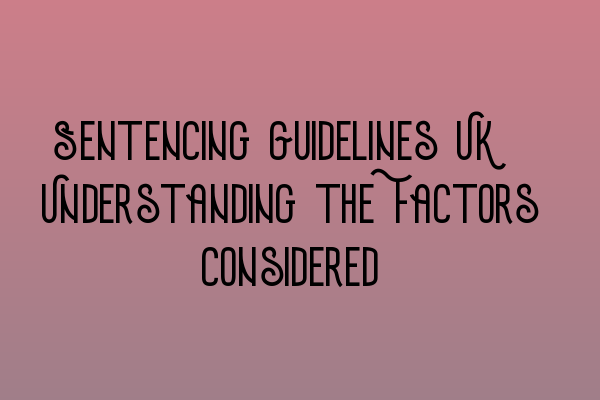Sentencing Guidelines UK: Understanding the Factors Considered
When it comes to criminal law in the United Kingdom, sentencing is a critical aspect of the judicial process. Sentencing guidelines provide structure and consistency in the determination of appropriate penalties for various offenses. Understanding the factors considered by the courts in sentencing is essential for both legal professionals and defendants. In this article, we will delve into the key aspects of sentencing guidelines in the UK.
The Purpose of Sentencing
The primary objective of sentencing is to ensure justice is served by imposing punishments proportionate to the gravity of the offense committed. Sentencing aims to protect the public, deter potential offenders, rehabilitate offenders, and promote reparation between the offender and the victim.
Factors Considered in Sentencing
When determining a suitable sentence, the courts consider a range of factors. The most significant factors include:
- Nature and Gravity of the Offense: The seriousness of the offense is a crucial element in sentencing. Courts assess the harm caused, level of violence involved, and any aggravating or mitigating factors.
- Previous Convictions: A defendant’s criminal history can impact sentencing. Repeat offenders may receive harsher penalties as a deterrent.
- Plea: Early guilty pleas are often considered favorably by the courts and can result in reduced sentences.
- Mitigating Factors: Any factors that reduce the offender’s culpability or show remorse may be taken into account. These include factors like age, mental health issues, or personal circumstances.
- Aggravating Factors: Conversely, aggravating factors such as premeditation, use of a weapon, or targeting vulnerable victims can lead to more severe sentences.
- Victim Impact: The impact of the offense on the victim or victims can influence the sentencing decision. Courts consider physical, emotional, and financial harm caused.
- Public Interest: Sentences may also reflect the need to protect the public’s interest, maintain public confidence in the legal system, and deter others from committing similar offenses.
Application of Sentencing Guidelines
In the UK, the Sentencing Council issues guidelines to assist judges and magistrates in determining sentences. These guidelines provide a framework for considering the relevant factors mentioned above. However, judges have discretion within these guidelines to consider individual circumstances and exercise their professional judgment.
It is crucial for legal professionals to stay updated with any changes or updates in the sentencing guidelines. This ensures they can provide accurate advice to their clients and present robust arguments in court.
For defendants, understanding the factors considered in sentencing allows them to prepare their defense effectively. It also helps manage expectations regarding potential outcomes and allows for informed decision-making.
Additional Resources
If you are preparing for the SQE exams or seeking further information about criminal law and practice, SQE Criminal Law & Practice Law UK offers comprehensive preparation courses. Visit their website to access useful resources such as SQE 1 Practice Exam Questions, SQE 1 Practice Mocks FLK1 FLK2, SQE 2 Preparation Courses, and SQE 1 Preparation Courses.
Stay informed about the latest SRA SQE exam dates by visiting their official website.
Understanding the factors considered in sentencing guidelines is crucial for anyone involved in criminal law. By familiarizing yourself with these factors and staying updated on legal developments, you can navigate the complexities of the legal system more effectively.
